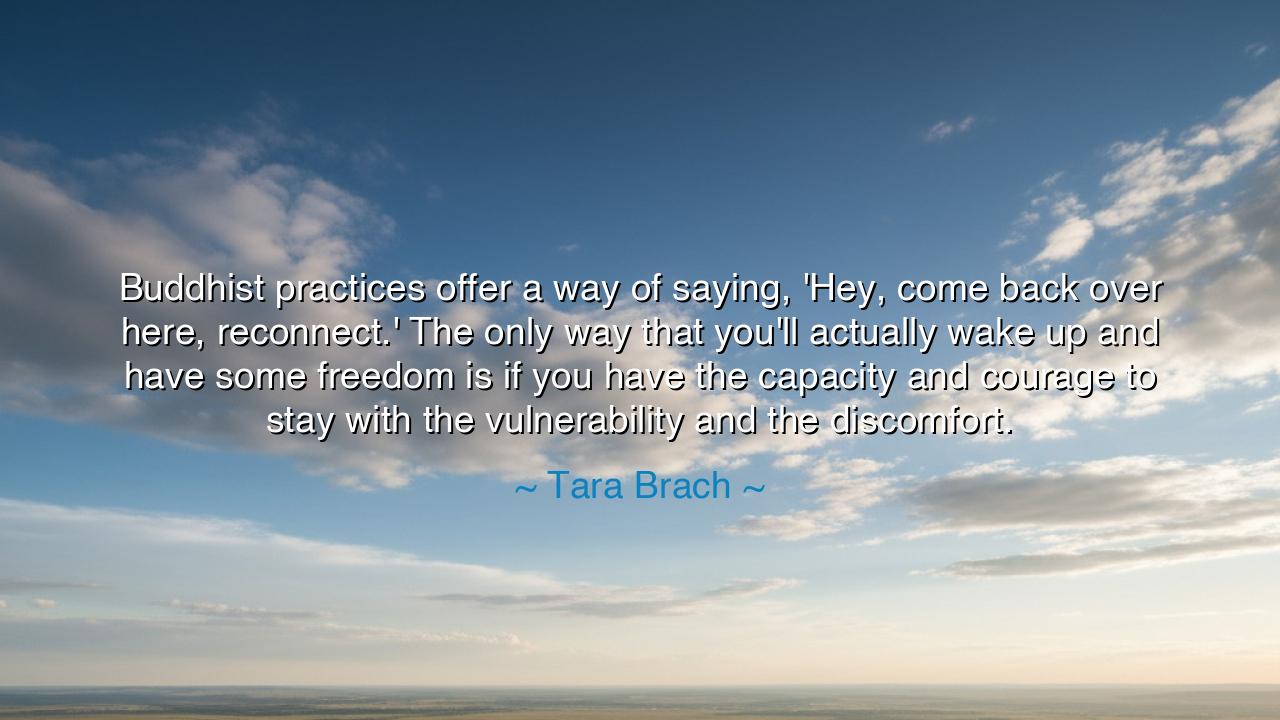
Buddhist practices offer a way of saying, 'Hey, come back over
Buddhist practices offer a way of saying, 'Hey, come back over here, reconnect.' The only way that you'll actually wake up and have some freedom is if you have the capacity and courage to stay with the vulnerability and the discomfort.






"Buddhist practices offer a way of saying, 'Hey, come back over here, reconnect.' The only way that you'll actually wake up and have some freedom is if you have the capacity and courage to stay with the vulnerability and the discomfort." Thus speaks Tara Brach, the modern teacher of mindfulness and compassion, whose voice carries the timeless wisdom of the Buddha into the restless world of today. Her words call to the weary heart, scattered and distracted by the noise of existence. They are not merely a reminder to meditate, but a summons to return—to come back home to the present, to the self, and to the tender truth of being human. For what she describes is not escape from suffering, but the sacred art of staying—of remaining present amid pain, fear, and imperfection until transformation dawns like morning after a long night.
At the heart of this teaching lies the essence of Buddhist practice—mindfulness, or the courageous act of turning toward reality instead of running from it. Life often urges us to flee discomfort: to numb, to distract, to deny. Yet Brach tells us that freedom does not come from avoidance, but from reconnection. To “come back over here” is to awaken from the trance of separation and forgetfulness. It is to stop chasing what is pleasant or pushing away what is painful, and to stand, for even a breath, in the unguarded truth of the moment. In this stillness, we rediscover the one thing the world cannot give us: our own presence.
But to do this—to remain with vulnerability—requires courage. For the human heart trembles before its own wounds. We fear the ache of loneliness, the weight of loss, the shadow of our own shame. Yet it is in the soft ground of that fear that wisdom grows. The Buddha himself faced temptation, doubt, and terror under the Bodhi tree. He did not flee them; he sat with them. And through his steadfast stillness, he awoke. In the same way, Brach calls us to face our discomfort not as enemies, but as teachers—to sit beside our pain, breathe with it, and listen to what it would tell us. Freedom, she says, is not found by rising above our humanity, but by embracing it fully.
In ancient times, even the greatest warriors knew this truth. Consider the story of Prince Arjuna in the Bhagavad Gita. When faced with the anguish of battle, he trembled, wanting to turn away. But Krishna, his divine guide, told him to stay—to act not from fear or desire, but from awareness. His courage was not in fighting others, but in facing his own heart. Likewise, Tara Brach’s words teach us that our awakening does not come from conquest, but from presence. To be still in discomfort is the battlefield of the soul, and victory lies not in escape, but in acceptance.
The origin of this wisdom is as old as the path of enlightenment itself. The Buddha taught that suffering, or dukkha, is the very doorway to liberation. When we resist it, we remain bound. When we turn toward it, we begin to see through it. This is the meaning of awakening—not a blissful trance beyond pain, but a deep peace within it. Tara Brach, through her teachings of Radical Acceptance, reminds modern seekers that we need not strive for perfection or transcendence. The sacred invitation is simply to reconnect with the truth of what is—to hold our vulnerability with kindness, and to trust that in doing so, the heart will heal itself.
Yet this is not the way of the faint-hearted. It asks of us patience, gentleness, and courage. It asks us to lean into the places that hurt, to breathe through the fear that rises like a tide. But those who accept this invitation begin to glimpse the quiet miracle that waits within the pain: that nothing we feel is separate from the great web of life. Our sorrow, our shame, our longing—all are threads in the tapestry of awakening. When we stay with them in mindful awareness, they transform from weights that bind us into wings that free us.
So, my children of tomorrow, hear this wisdom and take it to heart. When life wounds you, do not turn away. When pain calls, do not silence it. Come back over here, reconnect. Sit beside your sorrow as you would beside an old friend. Feel it fully, and let compassion be your guide. For only by dwelling within your vulnerability will you discover your true strength. Only by facing your discomfort will you uncover your deepest freedom. This is the path of awakening—the way of stillness, courage, and infinite tenderness. Walk it with patience, and you will find that even in the darkest night, there is light enough to see your way home.






AAdministratorAdministrator
Welcome, honored guests. Please leave a comment, we will respond soon